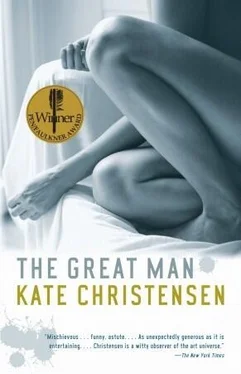“Ironic,” said Abigail. “But wonderful.”
“I’m disgusted by having to associate with Paula,” said Maxine with gusto and, Abigail suspected, a large dollop of disingenuousness. “Anyway, they’re probably just trying to get me to prove I really can paint a portrait, that Helena wasn’t a fluke, which it may well have been. Why can’t the piece just be about my real work?”
“You’re complaining about the premise of an Artforum piece about you?”
“I’m hardly complaining,” said Maxine.
There was a pause as both of them realized there was no more either of them wanted to say on the topic, at least for now.
“Guess who I’m having over for lunch today?” Abigail offered.
“I’m sure I can’t,” said Maxine.
“Teddy’s daughter and her two children,” said Abigail. “Samantha. She wants to come and meet her half brother. She called the other day, very shy and apologetic, wondering if I’d mind. I said, ‘No, of course not. Come up for lunch, but be forewarned: He’s not able to converse or make interpersonal contact.’ She said she knew that; she just wants to see him.”
“I think I see her sister at the dog run,” said Maxine. “Ruby.”
“How do you know it’s her?”
“She looks exactly like Oscar, and she’s the right age, and her dog is registered to Ruby Feldman.”
“Gosh,” said Abigail. “Why don’t you say something to her?”
“Because that’s not my style,” said Maxine. “Meanwhile, that’s all very modern and convivial, Teddy’s spawn having lunch with you.”
Abigail thought Maxine sounded uncommonly mellow today, but that made perfect sense. Long-thwarted ambitious people tended to be suddenly much nicer when they got the attention they felt they deserved. Oscar had been exactly the same way. So Maxine was at peace now; Abigail felt nothing but happiness for her.
After they hung up, she resumed feeding Ethan. “I wonder,” she muttered to him, wiping egg off his chin, “whether Maxine somehow engineered this. I just wonder. I wouldn’t put it past her….”
The phone rang again. Abigail put the spoon down and answered it. It was Ralph.
“Have you read today’s Times ?” he asked, sounding aggrieved.
“I just got off the phone with Maxine,” said Abigail. “She’s being interviewed for Artforum by Paula Jabar and Art in America by Jane Fleming. Her dealer is talking about a retrospective. And I’m sure that’s just the beginning. This is the best art scandal of the year. She’s on her way to superstardom.”
“But what about Oscar?” Ralph said. “Assuming I took you up on your offer, how would I make this look good for him in any way?”
“I do not see how this detracts from Oscar’s achievements or his greatness. So he lost a bet with his sister! Big deal! He painted Mercy, didn’t he? The answer is yes, because I was there; I watched him. It’s as great as Helena, if not greater. And this sudden bright light shining on Maxine will certainly be refracted or reflected, or whatever the word is, onto Oscar. This notoriety is only good for your book.”
“‘All publicity is good publicity,’” Ralph quoted in a tone that suggested he didn’t altogether buy it. “Sure.”
Abigail, hearing the anguish in his voice, said with compassion, “You shouldn’t idealize Oscar, Ralph. It’s not realistic. He was flawed in so many ways.”
“I know that,” said Ralph. “I have criticized him several times. I don’t idealize him, I don’t think.”
“Maybe that was the wrong word,” said Abigail. “I meant you shouldn’t be too disappointed as new truths about him come to light.”
“Maxine painted Helena, ” said Ralph. “I don’t believe it. That diptych changed my life. And one of the reasons it affected me so deeply was the actual juxtaposition of Mercy to Helena, a painting of a black woman and a painting of a white one. I was amazed at how one white male American painter was able to transcend race, paint a black woman the same way he painted a white one, without condescending or fetishizing. If he didn’t paint Helena, then how am I to interpret Mercy ?”
“I guess you could look at it as a portrait of my housekeeper,” said Abigail. “Not a bad one, either.”
Ralph was silent.
“Can you explain exactly why this upsets you so much?” Abigail asked.
“In the European tradition,” Ralph said, as if he hadn’t heard her, “black women in paintings are servants who kneel or stand behind the white women, holding their jewels or the trains of their robes — but also providing contrast, to show up the fair purity of their mistresses. You may be aware of the quote by Ruskin that goes, ‘I always think the main purpose for which Negroes must have been made was to be painted by Van Dyke and Veronese.’”
“I wasn’t aware of that quote, no,” said Abigail. “Well, what about Gauguin?”
“What about him?”
“His paintings of Polynesian women.”
“Sexual fantasies. Fetishizing. Pure romanticization of the femme sauvage. They’re about his own ego, his own damn self.”
“If you say so,” said Abigail. “But they’re beautiful.”
“ Mercy is about the woman herself. It’s about a Woman, capital W —not a black woman.”
Abigail could hear him inhale self-importantly through his nostrils and waited with half-annoyed trepidation to hear what he would say next.
“Oscar accorded her the same selfhood he accorded his white portraits,” Ralph went on when she didn’t say anything. “There is no self-congratulation in the painting, nor is there either lust or a sense of Other. That is remarkable.”
“But Oscar did paint Mercy, ” Abigail pointed out.
“But now it’s all changed.”
She smiled; he sounded so earnestly perturbed, like a child. “Why has this affected your opinion of Mercy ? Oscar painted Mercy; that hasn’t changed.”
“I was under the impression that he had painted Mercy and Helena as a diptych,” Ralph answered. “The brush strokes in both paintings are a departure from Oscar’s other work. They are bolder, more primitive. The colors are blockier, jazzier. The woman in Mercy is a nightclub singer: Did he employ this technique because it’s more, quote/unquote, negroid? No! Because look, he painted his blue-blooded society butterfly with exactly the same vivid, aggressive style, the same jazzy palette, the same reds and mauves and absinthe undertones.” He paused. “Except he didn’t. Maxine did.”
He stopped talking, but he wasn’t waiting for Abigail to contribute anything to this conversation; he was gathering his thoughts. Abigail noticed that her telephone mouthpiece smelled weirdly of broccoli. Had she been eating too many cruciferous vegetables?
“Both women represent stereotypes, but Oscar transcends these clichés of debutante and chanteuse by imbuing each one with an independent character that seems to break away from the artist’s brush and possess her own soul. I thought, seeing those paintings for the first time, that Mercy represented a real breakthrough in the representation of black women in mainstream, which is to say white male, art. I couldn’t put into words what I thought at the time; I was simply awestruck by the power I felt emanating from the juxtaposition of two women whose lives would hardly, in real life, touch each other.”
“Well,” said Abigail, “maybe you’re right, and Mercy has turned out to be as racially dubious a painting as anything Gauguin ever did, and Helena was just a stylistic imitation by another painter trying to win a bet. But maybe you also need to see Oscar clearly instead of needing him to be some great racial equalizer. He was as far from a racist as anyone I’ve ever met. Take it from me. I wouldn’t lie to you.”
Читать дальше












